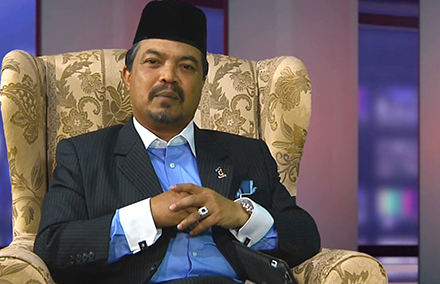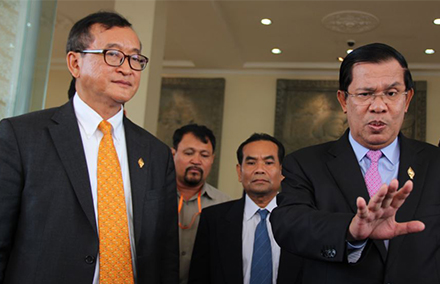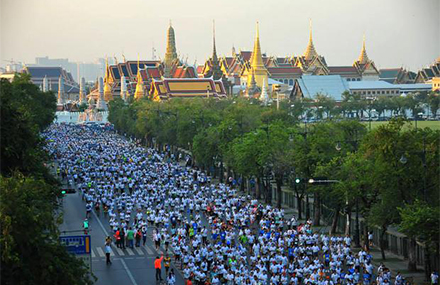Half-marathons running off into the distance, a missing opposition leader in Cambodia, more presidential drama in the Philippines, and Malaysian charity cases that aren’t.
In her weekly column New Mandala Associate Editor Mish Khan brings you the best and worst from the region.
Malaysia’s zakat squandered on splendour
Malaysia’s religious affairs minister, Jamil Khir Baharaom, has come under fire for allegedly paying for a luxurious eight-day trip to the US, totaling RM 410,000 with charity funds designated for orphans and the poor.
The money was drawn from the Islamic Economic Development Foundation (YaPEIM), originally formed to perform charity work in Malaysia or zakat. Akmal Nasir, the director of National Oversight and Whistleblowers (NOW), claimed that during the lavish trip Jamil Khir and his wife played golf and spent time shopping at luxurious, upscale stores.

Jamil Khir. Photo: YouTube
In response to public disgust, YaPEIM insisted that the amount was partially paid back by the minister. However, no breakdown of the costs were disclosed.
Last week, NOW also exposed that YaPEIM had spent RM 290,000 to fund a 14-day marriage course in Paris, attended by Malaysian students studying abroad. The necessity of organising such a course for wealthy Malay students was widely questioned.
Jamil Khir has since filed a defamation lawsuit against Nasir, claiming RM 10 million in compensation.
Duterte snatches the reins
Jubilation spread quickly in the Philippines on Saturday night after Rodrigo Duterte, the highly popular mayor of Davao, officially announced he will run for president in 2016.
Duterte has for months denied any intention to run, but claims the sudden change of heart was inspired by the Senate Electoral Tribunal (SET) ruling allowing rival candidate Senator Grace Poe to proceed. Duterte states he will “never accept an American as president”.
The Philippine Constitution requires presidential candidates to be natural-born citizens. Senator Grace Poe is an adopted foundling, as well as a former US citizen.

Rodrigo Duterte – fending off foreigners since forever.
A disqualification case was filed with the SET insisting that Poe fails to meet the Philippine citizenship requirements. Last Tuesday, the SET dismissed the case in a narrow 5-4 vote. This ruling is in disagreement with the Supreme Court, which found that under customary international law, Poe may be considered a naturalised citizen but not a natural-born citizen.
Duterte’s late-minute entry into the political race has uprooted the entire game thus far, with analysts certain he will win over votes from the other candidates.
Rain-sy, rain-sy, go away
Disappointed supporters of the opposition Cambodia National Resuce Party are hoping their party president Sam Rainsy will come again another day, following his decision to not return to Cambodia.
This follows the recent decision by the Phnom Penh Municipal Court to enforce a long-dormant 2011 defamation conviction against him.
In 2008, Rainsy jabbed that Foreign Minister Hor Namhong had run a Khmer Rouge prison. Last Monday, the ruling Cambodia People’s Party voted to remove him from the National Assembly stripping him of his parliamentary privilege.

Sam Rainsy (left) and Hun Sen in happier times. Photo: Wikimedia commons
Rainsy faces a two-year prison term if he returns to Cambodia. Although a CNRP spokesman originally announced Rainsy would return on Monday and face his arrest, Rainsy seemed to change his mind and is heading to France to seek political support in hopes of striking a deal.
The CPP are sceptical that Rainsy’s case will garner any interest in the West, stating “World leaders don’t have time for them due to the threat of ISIS… No one cares about the CNRP.”
They also berated him for comparing himself to Myanmar democracy figure Aung Sun Suu Kyi, who chose to face years in detention for her cause.
Opinions amongst CNRP supporters are mixed. Although many sympathise with Rainsy, others are disappointed in what they perceive as a demonstrated lack of bravery and a failure in his responsibility towards the Cambodian people.
Thailand’s mangled marathon
What do Thailand’s democratic transition and its annual half-marathon have in common? Answer: they are both poorly run and unnecessarily extended.
There was outrage in Thailand last week as it unintentionally became home to the world’s longest half-marathon.
The Standard Chartered Bangkok marathon, held on 15 November, accidentally increased its 21 kilometre route to 27 kilometres. The Athletic Association of Thailand, which oversees athletic events in the country, said that race officials directed runners to turn in the wrong place and thus lengthened each lap.

Photo: Newsweek
A tirade of complaints were unleashed on social media, with comments criticising the race as “ridiculous,” a “massive miscalculation,” and “incredibly dangerous.”
Many have dubbed the event the “super half-marathon”, with one commenter noting that “they increased the price this year, so at least you get more kilometres for your money.”
Mish Khan is Associate Editor of New Mandala, and an Asian studies scholar at The Australian National University.
 Facebook
Facebook  Twitter
Twitter  Soundcloud
Soundcloud  Youtube
Youtube  Rss
Rss 